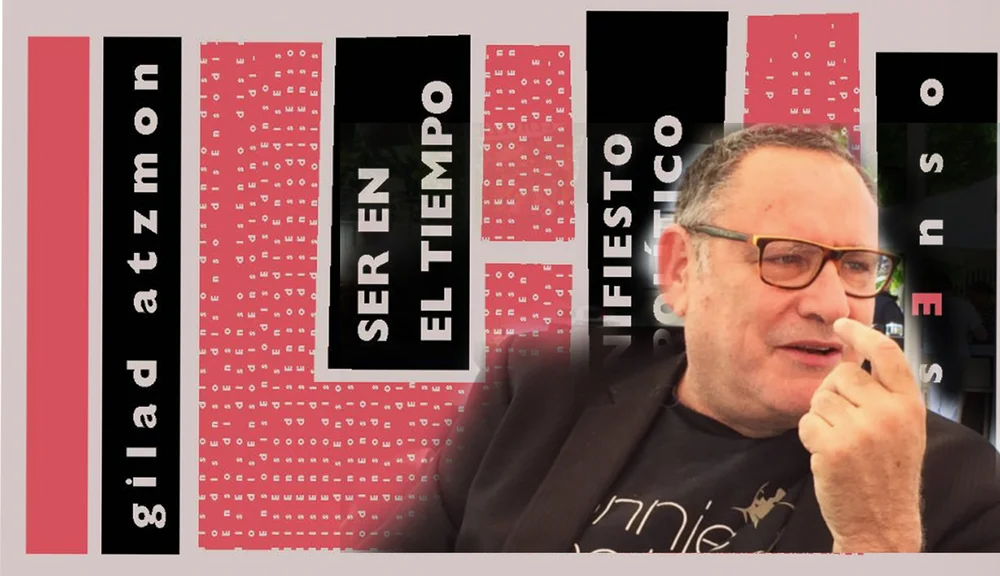By Teresa Aranguren,
Gilad Atzmon speaks in a torrent of words during our conversation on a sunny terrace in Madrid. He expresses himself passionately, neatly, but never runs over; he seeks to hit the nail and throws phrases like darts that aim to cross, penetrate and reach the other side, rather than hitting a target. I think he asks to be understood, and he makes an effort for it. It is likely because he feels or knows he is ‘misunderstood’.
Gilad Atzmon was born in Israel into a secular but actively Zionist family. He left the country in the early nineties, when he was thirty years old. He says it was the invasion of Lebanon in 1982 that opened his eyes to what Israel is, although it took him a while to leave the country where he was born and raised.
“It was not an easy decision. I left because I understood that I was dwelling in a land that belonged to others. Israel is Palestine. I have never returned, nor will I come back. “
To say that he is a controversial author is to fall short. Gilad Atzmon is provocative, very politically incorrect and has the gift of bothering right and left, that is, from the right and from the left. He defines himself as a philosopher of politics.
In his last book Being in Time, a Post-political Manifesto, published by Ediciones de Oriente and the Mediterranean and recently presented in Madrid, he attacks identity politics and what he describes as the tyranny of correctness, both phenomena that according to him are linked and feed each other “in the progressive circles that are so politically correct. People are encouraged to identify as a woman, as a gay, as a black, as a Jew or vegan, but not as a Muslim or White. This policy of exalting particular identities is very problematic and a serious danger, especially for the left, if you can still talk about the left … “
The question of identity has been the central theme of Atzmon’s work and perhaps his vital and intellectual adventures as well. After all, he is a Jew who grew up in a Zionist family … and is accused by some of anti-Semitism.
“In the past, anti-Semites were people who hated Jews, nowadays people who oppose Israel are labelled anti-Semitic. I’m in the same club as Bernie Sanders, George Galloway, Richard Falk or Roger Waters: the humanists of our time. They call us anti-Semites because we are against what Israel does and what has happened in Iraq and Syria, and the power of the Neocons and AIPAC in Washington … I have never criticized Jews for being Jewish, I am Jewish (GA: this is a mistranslation, I do not identify as Jewish), my wife is Jewish and … – he explodes in a laugh-, my mistress too. I want to be able to criticize Jewishness, the ideology that drives Jewish tribalism, the idea of a chosen people, as any intellectual criticizes Catholicism or as Weber criticized Protestantism, even though I know I’d pay a price for it. The essence of Jewish power is the power to silence all criticism of Jewish power. To say what I want to say, I had to renounce working in the academic world, although I fulfil all the requirements and have all the qualifications. I chose to live as a jazz musician, which is more difficult from an economic standpoint, but it allows me to speak freely.”
Many of his opinions irritate me, for example his contemptuous and ironic look towards the international brigades:
“most were revolutionary Jews who travelled to Spain because they wanted to give their lives in the name of the ‘international working class, but the real workers did not go to Spain, they stayed at home. Real working class people go to work in the morning the feel the urge to identify ‘as working class’).”
Nevertheless, understanding truth as what one believes is true, I recognize an authentic passion for the truth in what he writes and inquires.
Someone said (I think it was Kant) that more important than having the right answers is asking the right questions. In the writings of Gilad Atzmon it is not easy to find answers, but we always find new questions that worry, surprise, challenge the political consensus.
Gilad Atzmon does not accept taboos or the notion of sacred territory, where it is better not to enter. He refuses to let what the rest of us regard as unthinkable stay untouched. Sometimes, his opinions turn out to be impertinent, but their impertinence has to do with their boldness, undoubtedly a form of value.
Before saying goodbye, I ask him if he sees any way out of the drama of Palestine. He remains silent for a moment, searching for the precise words.
“I am not an activist, I do not like to tell people what they should or should not do. But I think the key is a matter of percentages and demographics. It is all about facts on the ground, when the Palestinian population reaches 70% of the total population in Israel, everything will start to change. To win, the Palestinians have to survive.”

 Uprooted Palestinian
Uprooted Palestinian 












No comments:
Post a Comment